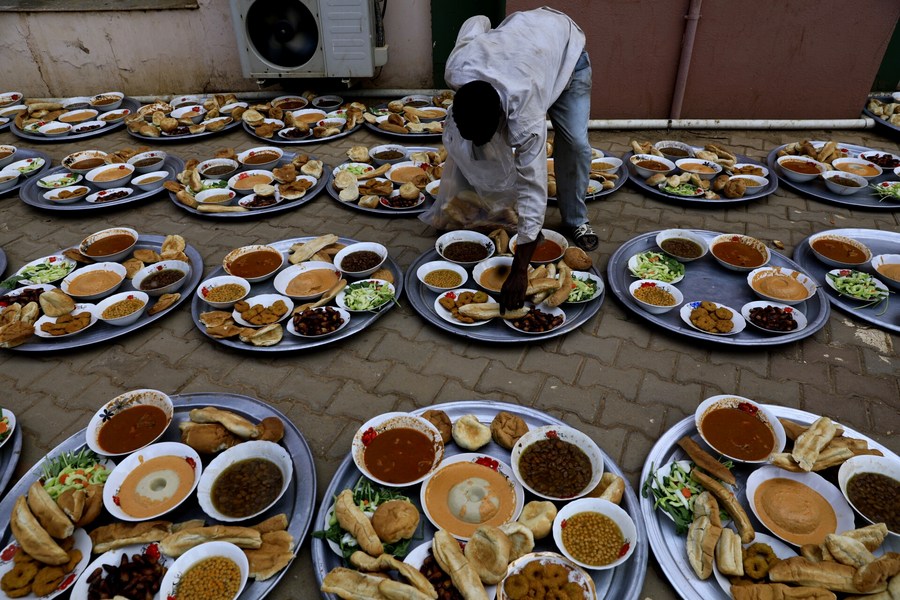
Many Sudanese in the capital, Khartoum, have been displaced since the outbreak of the war between the Sudanese army and the Rapid Support Forces (RSF).
About seven million people have sought refuge in relatively safer states.
Faced with a dire shortage of humanitarian aid, volunteers are actively preparing meals in public facilities and distributing them to those affected in neighbourhoods. Cooking is also done in designated areas in neighbourhoods, promoting communal dining—a social value among Sudanese that has facilitated the ease of adopting this approach.
Volunteers from emergency rooms, which are entities that volunteers formed to provide health and food assistance for the residents of Khartoum, rush to provide daily meals for hundreds of thousands caught between the lines of fire in the conflict.
Al-Tekkiya
Sudanese refer to public facilities that provide food for those in need as ‘Al-Tekkiya,’ which translates to hospice in English. The term is inspired by the word ‘itika’ in Arabic, which means sitting and eating whenever desired. Such practices are widespread in Sufi-influenced areas across the country and are also seen in social occasions like weddings and mourning tents.
With the intensification of battles in the capital, Khartoum, especially in residential neighbourhoods, civilians have no choice but to stay within the confines of their homes, hearing the sound of cannons passing over their rooftops. The forced closure of most markets due to the war and the economic standstill has reduced the financial resources on which citizens relied.
Perhaps due to the delayed response from the international community and UN organizations in providing relief to those stranded in Khartoum during the first two months of heightened armed conflict, coupled with the lack of safe passages, some citizens in neighbourhoods volunteered to organize communal kitchens in public facilities and provide food to the trapped residents.
Public kitchens
Gradually, these humanitarian projects have grown, spreading across most neighbourhoods in Khartoum. Omdurman is one of the prominent cities in the tri-city capital that hosts public kitchens in public facilities.
Volunteers rely on donations from individuals and some organizations from within Sudan and abroad to purchase food supplies. Donors often use banking apps as a quick way to send money for buying food items.
The centers operating in this field provide daily meals, mostly consisting of lentils and beans, and a dish called “Fatteh,” a meat and bread stew. Sometimes, dinner includes a rice dish.
Sudanese precedent
Volunteers prepare food for stranded individuals daily in the East Nile area of Khartoum. People can take their portions home, especially for the elderly or the sick. The widespread social solidarity among Sudanese in these locations raises questions, such as why the war breaks out in this country.
These volunteer centers that provide food may be a unique Sudanese precedent and a solution that emerged from the wreckage and extensive destruction of war.
The stranded had no choice but to stay in the capital, Khartoum, or in those cities where war rages, like Zalingei, El Geneina, Nyala, and Al Fashir. Displacement is also a tough option, given the lack of financial resources and uncertainty about whether the displacement area was better than their homes.
Even if there were no military battles, it is difficult for a citizen who has not received his salary for months, whose store has been looted, whose money has been stolen, or who has lost his financial sources of income – it is difficult for him to buy food.
Therefore, these volunteer centers that provide food may be a unique Sudanese precedent and a solution that emerged from the wreckage and extensive destruction of war, to the extent that Western officials had to commend the emergency rooms in sessions of the United Nations Security Council.
